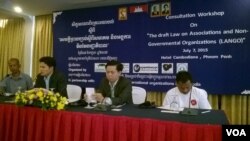[Editor’s note: Cambodia will participate at the global summit on climate change in Paris this December. World leaders will meet to find ways to curb climate change, much of which is the responsibility of developed countries, but which can severely impact poorer countries. VOA Khmer recently spoke with Tek Vannara, director of the NGO Forum, who will attend the summit, about Cambodia’s climate change issues and what the Paris talks could mean for the country.]
VOA Khmer: How will you take part in the environmental meeting in Paris? Who will come with you?
I will attend, as well as delegates from the government. We will leave Cambodia on Nov. 28. I will participate with officials working on climate change. Overall, we have to work with national and international civil society organizations in the country to have a common view.
What do you plan to do during the conference?
We will make a request to the industrialized, developed countries to help reduce greenhouse emissions. We also ask that they increase the country's budget and development budget related to adaptation to climate change with $100 billion a year. This could allow civil society organizations [in] developing countries be able to propose packages on adaptation to climate change. The people can have the ability to adapt to climate change. We will ask them to help transfer technological skills to developing countries. We request that they will not put conditions or demand fees regarding the skills.
If they demand the price or conditions to transfer technology, the least developed countries won’t be able to afford modern technology to reduce or adapt to climate change. We also propose that they help build the capacity of civil societies and communities that are suffering from the effects of climate change. We ask them to help the poor and developing countries to ensure that the governments of those countries have the ability and capacity with regard to the adaptation to climate change, and to participate in reducing global warming.
Is there anything else you are going to ask besides these?
Another point is that we will ask to discuss the markets of carbon credit. We’ll ask them to help make the price better. When the market is good for the price of carbon credits, this would allow developing and least-developed countries to keep forests for carbon credits to sell. They can use the money from selling carbon to contribute to the communities. The benefit will go to the communities living in the forestry areas, as well as to the governments of least developed and developing countries. If the market for carbon credits is not good, it will drastically lead to deforestation, and the timber trade will increase because people have no choice.
What is the money used for? Is this package for a single country or around the world?
It is for the whole world. The developed countries have promised to provide at least a package of $100 billion per year to least developed and developing countries, so they can spend it on adapting to climate change. So far they have not lived up to the promise yet. So we still keep asking for a proper package.
Could you say what this money would be spent on?
It would be spent on adaptation projects, as well as the reduction in infrastructure, water use and forest preservation. And the other thing is that it will also be spent on building and strengthening capacity of relevant institutions in the government, civil societies and communities.
Who are you going to meet officially and unofficially to tackle climate change issues?
Well, they are the European Union, Australia and the United States. We’ll also talk to China and other big, powerful and developed countries or the countries that emit huge volumes of greenhouse gases. We will have the opportunity to meet with major development partners, banks and potential intergovernmental funders. We can have both formal and informal talks with them related to the climate change situation in Cambodia as well as the challenges. We’ll require them to contribute in helping alleviate negative impacts of global warming.




